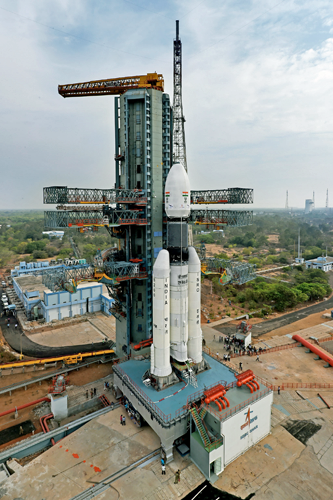
In a news story posted by The Hindu's online site by , the aim of the Indian Space Research Organisation (ISRO) is to get their spacecraft off the assembly line faster than ever before and to place more spacecraft into orbit.
The pace of Indian space launches is heating up and the ISRO has started scouting for additional manufacturers for most of their launch vehicle hardware. The launch vehicle program quickly needs multiple suppliers for many of the items that are already sourced from industry, according to K. Sivan, Director of Vikram Sarabhai Space Centre, which is the lead unit for ISRO’s three kinds of boosters. The boosters include the light-lifting PSLV, the bigger GSLV-Mark II, and the new and powerful rocket that is under trial — GSLV Mk III.

The fully integrated GSLV-Mk III D1 carrying GSAT-19. Photo is courtesy of ISRO.
ISRO plans to have parallel vendors for all rocket hardware, starting with interstages and light alloy structures for the PSLV’s four stages, fuel tanks, and solid motors, among others. The latest search is for makers of payload fairings or the nose cone at the top of launchers. The expanded base also is in line with ISRO’s plan to hand over production of all rockets to an industry consortium by 2020.
Dr. Sivan stated that today we are talking of eight PSLVs, two GSLVs, and two GSLV-MkIII vehicles. Existing vendors cannot meet (the requirement of supplying) 12 sets of hardware using their present capabilities. The goal of 12 a year almost doubles ISRO’s current rate of launching satellites. Having multiple producers of same hardware makes it easier for us and present vendors.
Early this month, VSSC issued an expression of interest or invitation of proposals from industry for making payload fairings. The “PLF” or nose cone encases the satellite until released in space and shields the spacecraft and various crucial instruments from shocks and disturbances during launch.
Defence aerospace company Hindustan Aeronautics Ltd. has been providing the rocket fairings, starting with four sets a year, and is now stretched into supplying six to eight fairings year and will continue to provide them, according to Dr. Sivan.
Around 90 percent of all launch vehicle inputs come from approximately 500 small to large industries from across India, both in the public and private sectors. Other manufacturing partners for rockets are Larsen & Toubro, Godrej & Boyce, Walchandnagar Industries, MTAR and Sri Venkateswara Aerospace, Hyderabad. Materials also come from defence entity Midhani and electronic items from Keltron, Centum of Bengaluru and Data Patterns of Chennai.
“Ideally we want industry to take over the production of PSLVs at the earliest,” said Dr. Sivan."An internal committee is drawing up a strategy."

